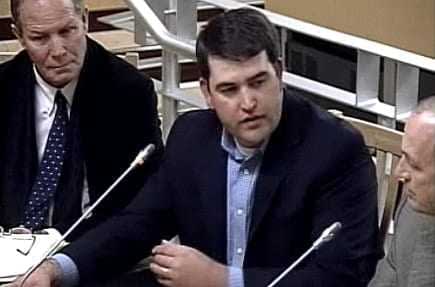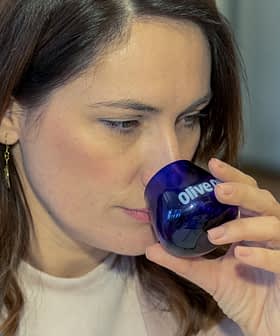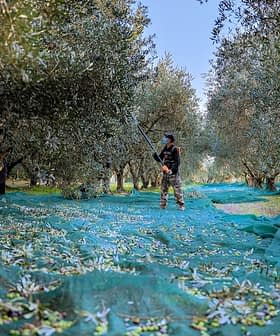
Adam Englehardt, vice president of California Olive Ranch is among those leading an effort to draft a federal marketing order for olive oil.
American olive oil producers are drafting a federal marketing order that would set higher quality standards, redefine grades and require new testing of all olive oil produced here. If they can get the order adopted by the USDA, industry sources say, domestic producers will push for the rules to apply to imports too.
The effort is the latest in a series of initiatives intended to level the playing field with olive oil importers who have long enjoyed an absence of quality enforcement in the world’s biggest market. The result has been an extra virgin grade with no real meaning, and an American public so accustomed to rancid olive oil, they actually prefer it in taste tests.
A draft of the marketing order (PDF) was first presented at a January conference held in Dixon, California and later discussed at a California State Senate subcommittee informational hearing.
Marketing orders are enforced by the USDA at the request of domestic growers to establish quality standards and pool their resources.
Section 8e of the Agricultural Marketing Agreement Act of 1937 (PDF) provides that when certain domestically produced commodities are regulated by a federal marketing order, imports must also meet the quality standards.
Oranges and tomatoes are among the imported commodities subject to marketing orders under Section 8e, and California olive oil producers will likely be waging a campaign to include olive oil in that group.
An outline of the marketing order was obtained by Olive Oil Times.
While those involved said the draft is being updated continuously as an advisory committee receives feedback from industry stakeholders and grower organizations, some of the main points of the working document are:
- Sweeping new labeling guidelines including specifications for best-by dates, grades and origin claims
- Producers would be required to have oils tested using new methods proven to be better at detecting adulteration
- Oils in the extra virgin grade would need to meet a series of new chemical specifications including a limit of 0.5% for free fatty acidity

California State Senator Lois Wolk (left), Adam Englehardt (California Olive Ranch), Paul Miller (Australian Olive Association), Bob Bauer (NAOOA) and Dan Flynn (UC Davis) at an informational hearing of the California State Senate Subcommittee on Olive oil and Emerging Products on January 26.
In response to the move, the North American Olive Oil Association, which is made up of the largest olive oil importers and distributors, alerted its members to “contact your national representatives,” (PDF) and NAOOA Vice President Eryn Balch called the draft “an attempt to restrict trade by completely eliminating several categories of olive oil, while also imposing rejected test methods on the industry.”
Not surprisingly, some in the domestic industry see it differently. California consultant Alexandra Devarenne said the U.S. industry was “just plain doing the right thing here by allying itself clearly and firmly with quality,” in a move that will benefit all honest traders.
The stakes are big for foreign and domestic producers who see the potential in the huge American market, where even an incremental rise in per capita consumption would provide a much-needed boost for a global olive oil industry roiling in a prolonged pricing crisis, and teetering on the edge of profitability.
The International Olive Council, whose member countries (the U.S. not being one of them) account for more than 98 percent of the global olive oil production, has not commented on the recent developments in California which are at odds with the IOC’s mandate to establish common international rules and “harmonize” laws to facilitate trade.
IOC Executive Director Jean-Louis Barjol has made it a priority for his administration to bring the United States into the ranks of IOC member countries. That prospect seems less likely now, and producers in the U.S. say they have little confidence that the Madrid-based, U.N.-sanctioned organization can bring about meaningful change in an industry long famous for its deceptive practices.
Critics say the current sleight-of-hand wording on labels permitted by the international standard and its lax chemical benchmarks are carefully crafted to facilitate unethical practices like passing deoderized oils off as extra virgin. It only seems more suspicious when representatives of major olive oil companies oppose the use of sensory assessment panels (experts trained to detect defective olive oil samples), calling them “too subjective.”
The IOC hasn’t come out against sensory panels and, in fact, the organization remains the most important certifier of expert olive oil tasting panels in the world. Last year, the UC Davis Olive Center panel received its IOC certification — the only one in the US — with some fanfare. This year, however, the panel failed to earn the coveted designation.
Instead of turning his sights on next year’s IOC test, Olive Center Director Dan Flynn said his panel will be first in line when the American Oil Chemists’ Society (AOCS) launches their new olive oil sensory accreditation program. “AOCS is the world’s oldest standards-setting organization for fats and oils and it is great that they are extending their accreditation services to olive oil sensory panels,” Flynn told Olive Oil Times. That program will be discussed at the society’s annual meeting in Southern California next month.
If anything, the gulf between New World producers and the IOC seems to be getting wider and the fledgling American industry is drawing inspiration from the Australians who recently adopted their own set of standards and waged a campaign to educate consumers on olive oil quality. Those standards, which the IOC condemned as a “barrier to trade” have been gaining some traction.
Australian Olive Association President Paul Miller hit the airwaves and led television crews through supermarkets shelves in a media blitz that pressed the big OZ retailers to respect the new standard. And while the Australian consumers’ tastes didn’t change fast enough to save the second largest Aussie producer from going bankrupt, imports sank 25 percent in the first three months of the current crop year.
Not all of that was offset by domestic sales, though, and the NAOOA’s Eryn Balch warned that badmouthing imported olive oils could wind up souring appetites for the product in all its forms. “A greater general concern is that the trend in Australia in the last few years has shown a general overall decline in consumption per capita during the time that the AOA has been promoting their similar campaign for quality,” Balch said, referring to data in an undated post on the website OliveBusiness.com.
It’s not total consumption that concerns quality-conscious producers — in the Old and New Worlds — who say they deserve a fair crack at whatever consumption there is. They contend many of the largest olive oil companies are built on models that depend on moving low-quality olive oil labeled extra virgin that just manages to measure up to the prevailing international chemical standard but would fail taste tests (which they are rarely subjected to). Modern testing methods and enforcement can level the playing field, and ensure consumers get what they pay for, reformers say, and that will benefit honest olive oil marketers everywhere.
Those modern tests cost money and producers will pass on the costs brought on by the new standards to consumers in the form of higher prices. The hope is that consumers will be willing to pay a little more if they know they’re getting a quality product.
The idea of an updated quality standard for olive oil is nothing new, noted Devarenne, “What is new is some of the technology for testing freshness and quality, and that will continue to develop with the science. The federal marketing order is a way for the domestic industry to organize its efforts.”
The implications of the bold initiative will likely extend far beyond American shores to the fledgling industries in Australia, South Africa, South America and other relative newcomers to the olive oil business.
Miller, who late last year began laying the groundwork for an organization of New World producers called the World Olive Oil Quality Alliance confirmed the situation in California was being watched closely. “Clearly the USA is part of this initiative so what happens there is of interest to the alliance but I think it is of equal interest to the whole olive world,” he said.








